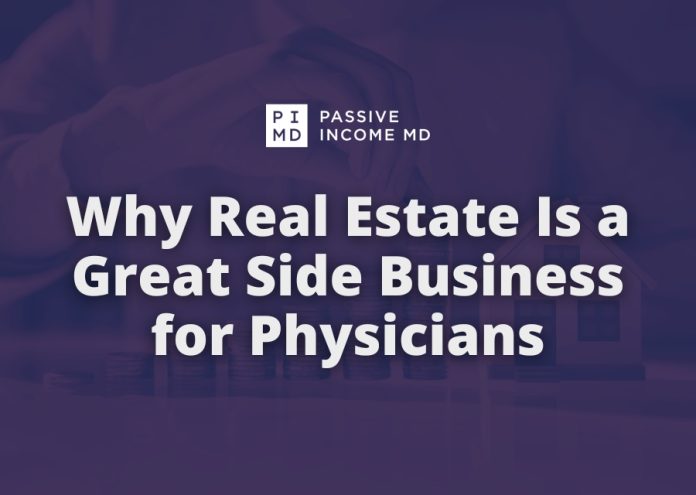What if there was a way that physicians could find a work/life balance?
Medicine is demanding–emotionally and physically. In healthcare, we’re often trapped in a cycle of long hours and high stress. Stacked on top of that is a lack of financial security and not having control over our time. It can be overwhelming. In fact, physicians are facing burnout at alarming rates. Not surprisingly, more and more physicians are deciding to walk away from medicine.
But that doesn’t have to be you.
Passive income through real estate offers a unique solution. It’s an ideal side business for physicians that can provide a financially secure future while still allowing you to practice medicine on your own terms.
It offers the stability of steady passive income and, through financial freedom, the chance to regain control of your time. It can also create long-term growth potential, provides tax benefits, and allows wealth building without adding to the grind of clinical work. In other words, real estate can give you the opportunity to live your ideal life.
Why Real Estate?
Before I explain why real estate is right for physicians, I want to talk more generally about its strengths as an investment opportunity.
Real estate stands out from other investments for many reasons, so let’s highlight some of its many strengths.
Tangible Asset
Real estate is a tangible, physical investment. Unlike stocks or bonds, which can feel abstract and volatile, real estate’s tangible nature provides a sense of security. You can see it, drive out to it, and manage the asset. We’ve all lived in a house or apartment. We’ve all walked into the commercial buildings that house our favorite stores. We know that buildings have inherent value. In times of market uncertainty, having a solid, tangible investment is comforting.
Steady Income Stream
One of the most compelling reasons to invest in real estate is the potential for steady cash flow. Well-chosen properties can generate rental income that exceeds your initial expectations. That provides a reliable financial cushion. Think about how wonderful it would be for money to be coming in without extra shifts or added clinic hours.
Don’t get me wrong; it’s great that your stock portfolio has gone up in value. That provides some level of comfort. But the number that you check on your app doesn’t really impact your daily life. It’s not steady, monthly cash flow hitting your wallet. That cash can make an impact.
I’ll never forget my very first (and very small) real estate investment. It was a crowdfunded deal. It netted me $47 a month. It wasn’t much at all, but it felt amazing to take my wife out to a nice lunch once a month knowing it was paid for.
Appreciation Potential
Real estate values tend to appreciate over time. While there will be market fluctuations, the long-term trajectory of real estate is upward. When combined with the rental income you’re receiving, your return on investment can grow significantly. This is how real estate investing can lead to game-changing wealth building.
Leverage Opportunities
Real estate allows for leveraging, meaning you can own and control a much larger asset than what you might be able to afford upfront. A relatively small down payment can secure a valuable property, increasing your overall return and entry into the market.
Tax Benefits
Investing in real estate offers several tax advantages. You can deduct mortgage interest, property depreciation, and operating expenses, all of which lower your taxable income. Plus, capital gains on properties can be deferred through 1031 exchanges. The most obvious benefit to the 1031 exchange is that it makes your investments more tax-efficient. But it can also help you access bigger investments (and their bigger returns) down the road. That can essentially compound your investment returns over time.
Hedge Against Inflation
Inflation is real, and things are getting too expensive. We feel it every time we go to the grocery store. Real estate provides an excellent hedge against inflation. As living costs rise, so do property values and rental prices, which means that your investment will retain its real value, and possibly even increase it over time.
Diversification
Diversification is a crucially important investment strategy. The rule of thumb is to never put your eggs all in one basket.
Adding real estate to your investment portfolio can diversify your portfolio, reducing overall risk. Investment-wise, real estate behaves differently than stocks or bonds, which means that even if the stock market is down, your real estate investments can remain strong. With diversification, your portfolio stands a better chance at staying balanced when other markets suffer.
Control Over Investment
It can be scary to give up control of your nest-egg portfolio to a broker, even if you collaborate with them on choices. Real estate gives you back control—something physicians often crave but rarely experience. You’ll make the decisions on how to improve the poetry, who to rent it to, and how much to charge. That control can lead to better financial outcomes.
The Benefits of Real Estate for Working Physicians
I know firsthand that starting a side business of real estate investing can transform your life. In many ways, that’s my story. When I began looking outside medicine for a way to make more income while gaining back time and autonomy, I chose real estate.
I understood that real estate was the best way to get started. Over time, that realization proved correct. And after helping countless physician colleagues on their own journeys to financial freedom, I think many here in the Passive Income MD community would also agree. So what makes it such a viable form of investing for physicians? Let’s take a look.
1. It’s Income That’s Not Tied to Your Time
As physicians, we earn money by trading time for work. It could be patient visits, surgeries, or overnight shifts. Whatever it may be, we are getting paid for our time. Real estate changes that equation. Rental income or dividends from syndications create cash flow that can be relatively passive, meaning you’re making more money without having to schedule more surgeries or see more patients.
2. You Can Leverage Your Money to Make More Money
Real estate allows you to take the money you’ve earned in medicine and multiply it. Through leveraging and appreciating property values, what starts as a modest investment can quickly grow. And with the tax benefits we discussed, you get to keep more of what you earn. And when you keep more, you have more to reinvest. That means your medical income can scale. When you tap into real estate as a side business, it’s possible to replace your medical income to practice on your own terms.
3. You’ll Experience Reduced Burnout, More Freedom
As you know, physician burnout is a growing problem. With real estate investing, you have an offramp from the medical grind. With additional steady income, you have the option to work fewer hours, cut back on the on-call shifts, or even transition to part-time medicine.
Real estate investing gives you the ability to take back control of your time and shape your work/life balance how you see fit. With a solid real estate portfolio, you’ll rest easier knowing that you’re building wealth regardless of how much time you put into medicine. Speaking of building wealth…
4. You Can Build Long-Term Wealth
Real estate isn’t just about short-term gains through steady rental checks. Over time, properties should increase in value. When that happens, you’ll build equity. As your equity grows, so does your financial security.
Something that sets real estate apart from other investment types is this: Real estate often provides a combination of both immediate cash flow and long-term value. Not only will you be collecting monthly checks, but when you eventually sell, you should see huge gains on your initial investment.
5. It Gives You Financial Security and Peace of Mind
One of the biggest challenges we face as physicians is the uncertainty of the future. Whether it’s ongoing changes to the healthcare industry or the fluctuating job market, it doesn’t feel as financially safe to be a doctor as it once did. Real estate gives you a safety net. It ensures that even if things change in medicine, you’ll have a financial foundation that isn’t dependent on your clinical work.
A Path to Financial Freedom
Real estate investing offers physicians a path to financial freedom—freedom that stops the stress and exhaustion that comes with extra shifts or clinical responsibilities. It provides control over your future. It allows you to create passive income streams, build long-term wealth, and reduce the risk of burnout.
So if you’re looking to take back control of your career, find more balance, and secure your financial future, real estate could be the answer you’ve been looking for. And if you don’t know where to start, my advice is to always start with an education. Connect with your community. It sounds daunting, but you have resources tailored to physicians like you.
For example, join our Passive Real Estate Academy. It’s a proven, 3-month course with a clear roadmap to success. It helps you learn the fundamentals of passive real estate investing. And it connects you to a community of experts who can not only support you but also help gain confidence in an investment world that might be new to you. You’ll learn how to invest intelligently, gain access to deals, build a portfolio, and ultimately work toward creating stable passive income streams.
We here at Passive Income MD can’t wait to support you on your journey to financial freedom. Take the actionable steps today to take back control of your time. Thanks for reading, and stay inspired!
Peter Kim, MD is the founder of Passive Income MD, the creator of Passive Real Estate Academy, and offers weekly education through his Monday podcast, the Passive Income MD Podcast. Join our community at the Passive Income Doc Facebook Group.
https://blog.5gigbucks.com/create-your-very-own-auto-publish-news-blog-site-and-earn-passive-income-in-just-4-easy-steps/







